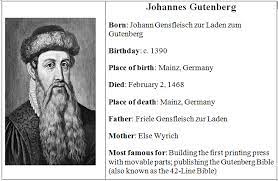Johannes Gutenberg Biography

BIRTH: ca. 1399 Mainz, Germany
DEATH: February 2, 1468
Mainz, Germany
Johannes Gutenberg Biography : Printing Press, Inventions & Facts
Johannes Gutenberg was a German goldsmith, printer, publisher and also a well-known inventor. He was the first person to introduce the movable-type printing press in Europe, which was used until the twentieth century. He introduced the first-ever printed book with the movable type called Forty-Two-Line Bible or the Gutenberg Bible.
Johannes Gutenberg was born around 1399 in Mainz, Germany, to Friele Gensfleisch zur Laden and Else Wyrich. He was the youngest in his family. His father was a well-known merchant.
From a very young age, Johannes took an interest in reading. The books that he used to read were written by hand. These were known as ‘manuscripts’, which implied ‘hand written’. He belonged to a wealthy family, to whom books were easily available. Johannes wanted other people to be able to afford these books as well, so he decided to create a quicker way of printing. The earliest widely used printing machine and method was known as ‘block printing’. The machine was made of wooden blocks, and each block would print only one page at a time. It was the slowest method of producing copies of books.
In 1428, Gutenberg got a job in the jewelry industry. He learned how to cut gems and make jewelry. Gutenberg did most of his experiments in secret. He turned his home into a workshop, where he worked day and night. He often felt disappointed as most of his experiments failed. He suffered financial crises, as he invested most of his savings in his experiments. He met Johann Fust, a wealthy goldsmith and lawyer at his old home, Mainz in 1448. Fust helped Gutenberg financially and Gutenberg continued his work. In just two years, his new printing press machine was ready.
He came up with many ideas for creating this printing machine. First, Gutenberg designed a little hardwood block, which printed a single letter at a time. It was a very slow process. Then, he moved to movable types, which printed only one page. He believed that using wood for printing was the reason behind his failure. So, Gutenberg moved away from wood types and decided to use metal types. It was a success, and he was able to print his first book in a few years. His business grew and he got into a partnership with Johann Fust, who helped him with his business. But soon, Fust blamed Gutenberg for spending his money and not creating any profit in return. Gutenberg lost his business eventually and all the rights went to Fust.
The first pieces printed from the press were German poems. Soon, he started to print the Latin Bible and Latin grammar texts. Gutenberg’s most famous work was the 300 page book, the Gutenberg Bible, with each page containing 42 lines.
These books, for the first time, were available to people outside the church. He opened his second workshop at his birthplace, Mainz. Everyone in Europe knew about Gutenberg at this point and his feat of mass production of books. He printed hundreds of Bibles in very little time.
The Gutenberg press was a major invention in world history. The books evolved from handwritten to printed books. It all became possible due to Gutenberg’s hard work and dedication. He introduced the fast printing press, which decreased the cost of books and saved time. The Gutenberg press continued to be used in the nineteenth and twentieth centuries. The works printed by him are considered rare and constitute some of the most valuable printed material in the world.
He received the title of Hofmann for his scientific work. He was called a ‘Gentleman of the Court’. The honor came with money, clothing and food, which was provided to him until his death.
Gutenberg died in 1468 in Mainz, Germany and left a great legacy behind. His prints achieved great fame, and sold millions of copies all over the world. Project Gutenberg, the oldest digital library, was built as a tribute to Gutenberg. In 1952, the United States released stamps to honor Gutenberg’s invention. Time magazine declared that the Gutenberg invention was the most crucial work in the history of inventions. A minor planet called ‘777 Gutenberg’ was named after him. He is still remembered as a great printer and innovator.
- What is meant by Database Management System?
- Discuss the advantages and drawbacks of database.
- What do you mean by database ? Discuss its Characteristics.
- What is Data Mining?
- What are the conditions of communication?
- What do you mean by business communication ?
- organization / Differentiate between classical and modern theory of organization
- What is forecasting






